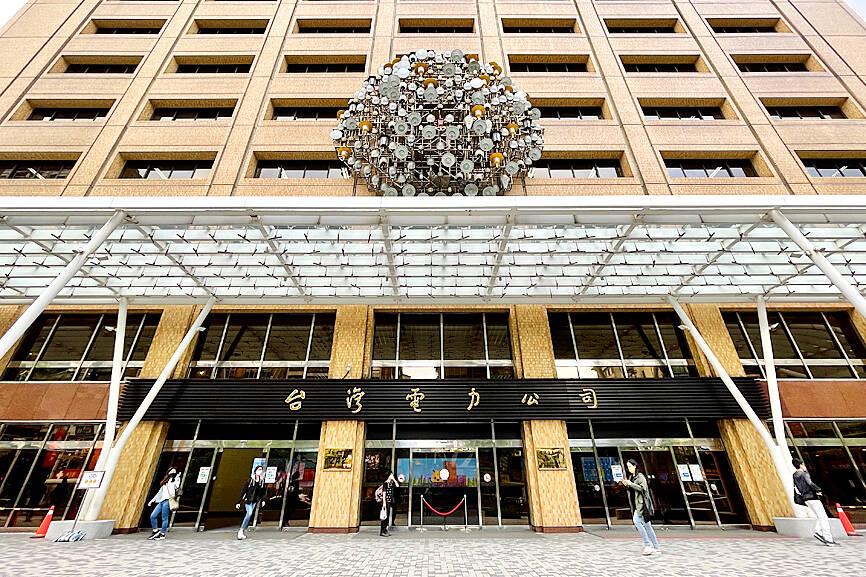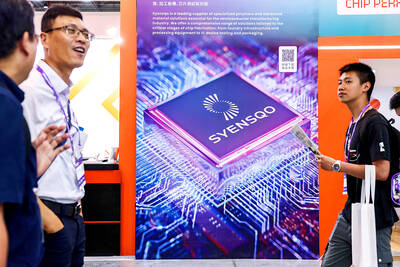Taiwan Power Co (Taipower, 台電) plans to issue NT$20.8 billion (US$676.64 million) in unsecured corporate bonds next month to boost its working capital after experiencing heavy losses this year, the state-owned utility said yesterday.
The planned bond sale aims to ensure that the company has the working capital needed to maintain an adequate supply of electricity, Taipower said in a statement after its board approved the plan.
The debt is to comprise NT$6.4 billion of three-year bonds with a coupon rate of 1.60 percent, NT$8 billion of five-year bonds with a coupon rate of 1.65 percent, NT$3.2 billion of seven-year bonds with a 1.80 percent coupon rate and NT$3.2 billion of 10-year bonds with a coupon rate of 1.90 percent, Taipower said.

Photo: George Tsorng, Taipei Times
Taipower’s accumulated losses were NT$172.3 billion as of the end of October due to rising international energy prices, especially natural gas, it said.
Due to the war in Ukraine, Taipower in the first 10 months of this year spent NT$500.7 billion on energy, up sharply from the NT$263.5 billion it spent during the same period last year, it said.
The utility’s soaring costs reflect Taiwan’s continued dependence on fossil fuels for its power supply. In the first 10 months, 42.4 percent of Taiwan’s electricity was derived from coal and 38.4 percent from natural gas, Taipower data showed.
Taipower generated 68.7 percent of the country’s electricity supply, with the rest coming from private plants that sell their output to Taipower. Data showed that 43.1 percent of Taipower’s output came from natural gas and 38 percent from coal.
Although Taipower reported accumulated losses of NT$230.2 billion as of the end of October, the figure was lowered to NT$172.3 billion due to a change in accounting standards, the company said.
The accumulated losses nonetheless represent more than 50 percent of the company’s paid-in capital of NT$330 billion, which led Taipower’s board to approve a plan last week, based on the company’s charter, to sell NT$150 billion in new shares to boost its paid-in capital.
The Ministry of Economic Affairs is likely to purchase all of those shares, Taipower said.
Additionally, Taipower’s board has also approved a plan to raise the ceiling of the company’s capital scale to NT$600 billion, from NT$400 billion, paving the way for the issuance of new shares.
The bond issuance increases Taipower’s debt, which rose steeply in the first 10 months to NT$2.14 trillion as of the end of October, up from NT$1.82 trillion a year earlier.
Of that debt, NT$1.33 billion was short-term, up from NT$1.07 billion a year earlier.

SEMICONDUCTOR SERVICES: A company executive said that Taiwanese firms must think about how to participate in global supply chains and lift their competitiveness Taiwan Semiconductor Manufacturing Co (TSMC, 台積電) yesterday said it expects to launch its first multifunctional service center in Pingtung County in the middle of 2027, in a bid to foster a resilient high-tech facility construction ecosystem. TSMC broached the idea of creating a center two or three years ago when it started building new manufacturing capacity in the US and Japan, the company said. The center, dubbed an “ecosystem park,” would assist local manufacturing facility construction partners to upgrade their capabilities and secure more deals from other global chipmakers such as Intel Corp, Micron Technology Inc and Infineon Technologies AG, TSMC said. It

People walk past advertising for a Syensqo chip at the Semicon Taiwan exhibition in Taipei yesterday.

NO BREAKTHROUGH? More substantial ‘deliverables,’ such as tariff reductions, would likely be saved for a meeting between Trump and Xi later this year, a trade expert said China launched two probes targeting the US semiconductor sector on Saturday ahead of talks between the two nations in Spain this week on trade, national security and the ownership of social media platform TikTok. China’s Ministry of Commerce announced an anti-dumping investigation into certain analog integrated circuits (ICs) imported from the US. The investigation is to target some commodity interface ICs and gate driver ICs, which are commonly made by US companies such as Texas Instruments Inc and ON Semiconductor Corp. The ministry also announced an anti-discrimination probe into US measures against China’s chip sector. US measures such as export curbs and tariffs

The US on Friday penalized two Chinese firms that acquired US chipmaking equipment for China’s top chipmaker, Semiconductor Manufacturing International Corp (SMIC, 中芯國際), including them among 32 entities that were added to the US Department of Commerce’s restricted trade list, a US government posting showed. Twenty-three of the 32 are in China. GMC Semiconductor Technology (Wuxi) Co (吉姆西半導體科技) and Jicun Semiconductor Technology (Shanghai) Co (吉存半導體科技) were placed on the list, formally known as the Entity List, for acquiring equipment for SMIC Northern Integrated Circuit Manufacturing (Beijing) Corp (中芯北方積體電路) and Semiconductor Manufacturing International (Beijing) Corp (中芯北京), the US Federal Register posting said. The